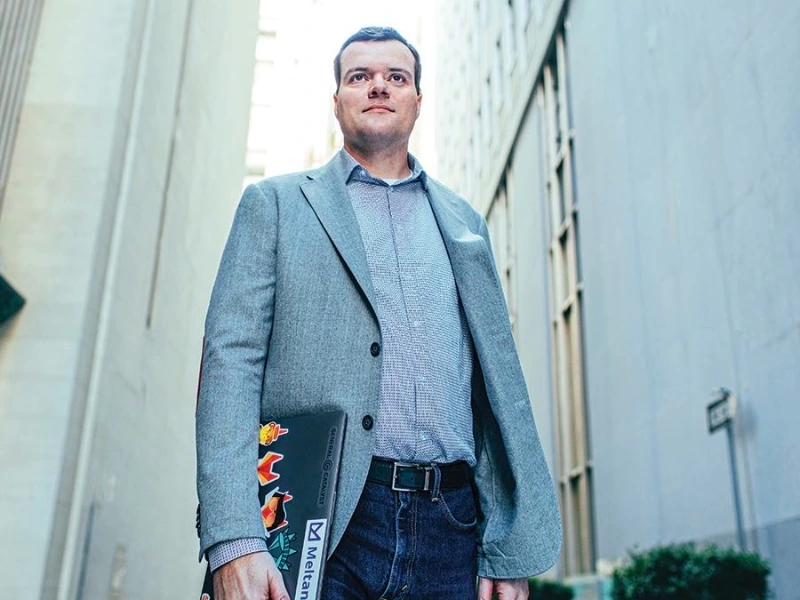- Sid Sijbrandij, co-founder and CEO of GitLab, spearheaded the transformation of the company into the world’s largest all-remote organisation, with over 2,000 team members spanning 60 countries and regions.
- Embracing virtual collaboration well before the Covid-19 pandemic, GitLab under Sijbrandij’s leadership developed best practices centered on measuring output, aligning on values, transparent documentation, and reinforcing self-management skills.
- Sijbrandij’s visionary leadership and unwavering commitment to transparency and collaboration have earned him widespread respect and admiration from peers, colleagues, and industry experts alike.
When two software engineers decided, in 2013, to launch an enterprise software-as-a-service business around GitLab—the open-source collaborative software-development application that they’d been working on—they didn’t intend to turn it into the world’s largest all-remote organisation. But they lived 2,000 kilometers apart—one in Ukraine and the other in the Netherlands—and their first hire was in Serbia. None of them wanted to move, so GitLab began its corporate life with a small, distributed workforce. As the founders began hiring more people, they made it official: The company would have no offices; employees could work from anywhere. Today GitLab’s 2,000 team members are spread across some 60 countries and regions around the world. The company neither owns nor rents any corporate office space. Well before the Covid-19 pandemic hastened such a shift for other organisations, GitLab’s leaders embraced and developed best practices around virtual collaboration. They learned that success depends on measuring output, not input; aligning people on norms and values; ensuring that policies and processes are continually and openly documented; and reinforcing key self-management and people-management skills.
Also read: Who is Pawel Czech? Co-founder of New Native was a 2023 Europas winner
Who is Sid Sijbrandji?
Born and raised in the Netherlands, Sid Sijbrandij’s fascination with technology began at a young age. He exhibited an innate curiosity for computers and programming, which eventually led him to pursue a degree in computer engineering. Sijbrandij’s entrepreneurial spirit was evident even in his formative years, as he dabbled in various tech ventures before finding his true calling with GitLab.
Sid Sijbrandij now serves as the Co-founder, CEO, and Board Chair of GitLab Inc., a pioneering DevSecOps platform streamlining software delivery while bolstering security and compliance. Prior to GitLab, his career took unique turns, from crafting recreational submarines at U-Boat Worx to contributing to innovative web applications at Ministerie van Justitie en Veiligheid’s Legis project. Fascinated by Ruby code since 2007, Sid honed his programming skills independently, eventually encountering GitLab in 2012 and embracing his passion for open source. By commercialising GitLab and leading it through Y Combinator’s Winter 2015 batch, Sid propelled the company’s growth, attracting over 30 million registered users, from startups to global enterprises. Sid holds an M.S. in Management Science from the University of Twente, Netherlands, and was recognised as one of the pandemic’s influential minds by Forbes.
Make a living without commuting? Try Gitlab
Sijbrandij’s journey with GitLab commenced in 2011 when he co-founded the company with a mission to revolutionise the way software development is conducted. What started as a modest project soon burgeoned into a global phenomenon, with GitLab evolving into a comprehensive DevOps platform trusted by enterprises of all sizes. Under Sijbrandij’s astute leadership, GitLab experienced exponential growth, propelled by a relentless focus on innovation, collaboration, and customer-centricity.
Sijbrandij’s stewardship saw GitLab transition from a scrappy startup to a unicorn company, securing significant investments and garnering widespread recognition within the tech community. His strategic vision and unwavering commitment to openness and transparency are reflected in GitLab’s unique approach to remote work, epitomised by the company’s famous “Handbook,” a comprehensive guide to its culture and values.
Also read: Securing your remote workforce with Aegis cloud backup solutions
What inspires Sijbandij to build a remote-work company?
In 2013, when Dmitriy Zaporozhets and Sid Sijbrandij decided to launch an enterprise business centered around GitLab, their collaboration was born out of necessity. Living 2,000 kilometers apart—Zaporozhets in Ukraine and Sijbrandij in the Netherlands—their remote working arrangement was not by design but by circumstance. With their first hire in Serbia, they embraced a distributed workforce model from the outset.
As the team grew, initially Netherlands-based members congregated at Sijbrandij’s house, but they soon realised physical proximity wasn’t essential for effective collaboration. By 2015, after participating in a Y Combinator boot camp, they prepared to expand into the U.S., establishing a presence in the San Francisco Bay area. However, the brief office gatherings quickly revealed that colocation wasn’t imperative for productivity. Thus, the decision was made: GitLab would become an all-remote company.
“Remote work is just work.”
Sid Sijbrandij, CEO and co-founder of Gitlab.
Today, with over 2,000 team members spanning 60 countries and regions, GitLab operates without any corporate office space. This early adoption of an all-remote approach is seen as instrumental in fostering scalability and organisational agility.
Remote work is ideal, but it’s hard
At GitLab, the platform itself serves as the backbone for collaborative work, covering everything from initial coding to deployment and performance tracking. Through milestone-project setups, issues are assigned and progressed via merge requests, ensuring thorough diagnostics before any launch. Remote work is woven into the fabric of operations; the globally dispersed team relies on tools like Slack and Zoom for seamless communication. Productivity isn’t bound by traditional office hours; success is gauged through department-specific metrics, not clocked hours. Embracing remote work fosters a culture focused on results, leading to quicker project completions and enhanced outcomes.
Sijbrandij admitted that he was a little worried when those first few Dutch team members stopped coming into the home office, he would fashion for the team. “Were the chairs not comfortable enough? Are the snacks not tasty? Had I forgotten to shower? My colleagues assured me that it was them, not me: They were simply more productive on their own time, in their own spaces, without commutes. ”
Though he has made it he still thinks promoting it is hard. “What I’m not surprised about is that many companies – even the biggest and most financially successful – are choosing to go back to the office. Why? Because all remote work is hard, and it’s even harder for companies who didn’t start off all-remote from day one. It requires discipline at scale, each and every day, to get right. Companies that get remote work right have that level of discipline and are laser-focused on communicating async.” And apparently, not everyone approves of the idea. Elon Musk claims the idea “is not for everyone”.
“Remote working is not for everyone, and not every job can be done remotely. But for those who are able to do it effectively, it can lead to increased job satisfaction and better work-life balance.”
Elon Musk
Sijbrandij visions the future work model in a transforming and optimistic way.
“The future of work is not about where you work; it’s about how you work. Let’s all take advantage of the fact that remote work introduced to virtually every company the tools, systems, and behaviors that create efficiency and inclusivity.”
GitLab handbook
The GitLab handbook serves as both a documentation and reflection of the company’s culture. With over 2,000 web pages, it encompasses a wide array of information, from basic operational queries to insights into the company’s values. This includes 22 ways the company reinforces its values, such as promoting individuals who align with them and incorporating them into corporate traditions like the karaoke rendition of “You’re the Iteration.”
The executive team, including Sid Sijbrandij, leads by example. Within the handbook’s team section, Sid’s profile offers not only his biography but also a candid list of his flaws, encouraging feedback from colleagues. Direct reports provide guidance on working with Sid, and instructions for scheduling one-on-one time with him are readily available. Additionally, Sid hosts monthly “iteration” office hours, inviting team members to engage in discussions on enhancing incremental innovation and expediting project delivery.

An excellent leader
Peers and colleagues universally praise Sijbrandij for his visionary leadership and unwavering integrity. “Sid’s ability to inspire others and rally them around a shared vision is truly remarkable,” remarks a senior executive at a leading tech company. “His commitment to transparency and collaboration sets him apart as a leader in the industry,” adds a prominent venture capitalist. Indeed, Sijbrandij’s impact transcends organisational boundaries, earning him the respect and admiration of fellow entrepreneurs, industry experts, and community members alike.
Many of the people he worked with spoke highly of him.
“He has a keen insight into the needs of the users he represents as well as a solid technical background. He communicates clearly and was open to comments and suggestions. He has a good understanding of and high affinity with agile project management and was able to keep meetings short and focused. All this made him critical to the success of the project.”
Alex Kuiper, an independent Scala/Kotlin/Java developer. Sidbrandij used to be his customer.

